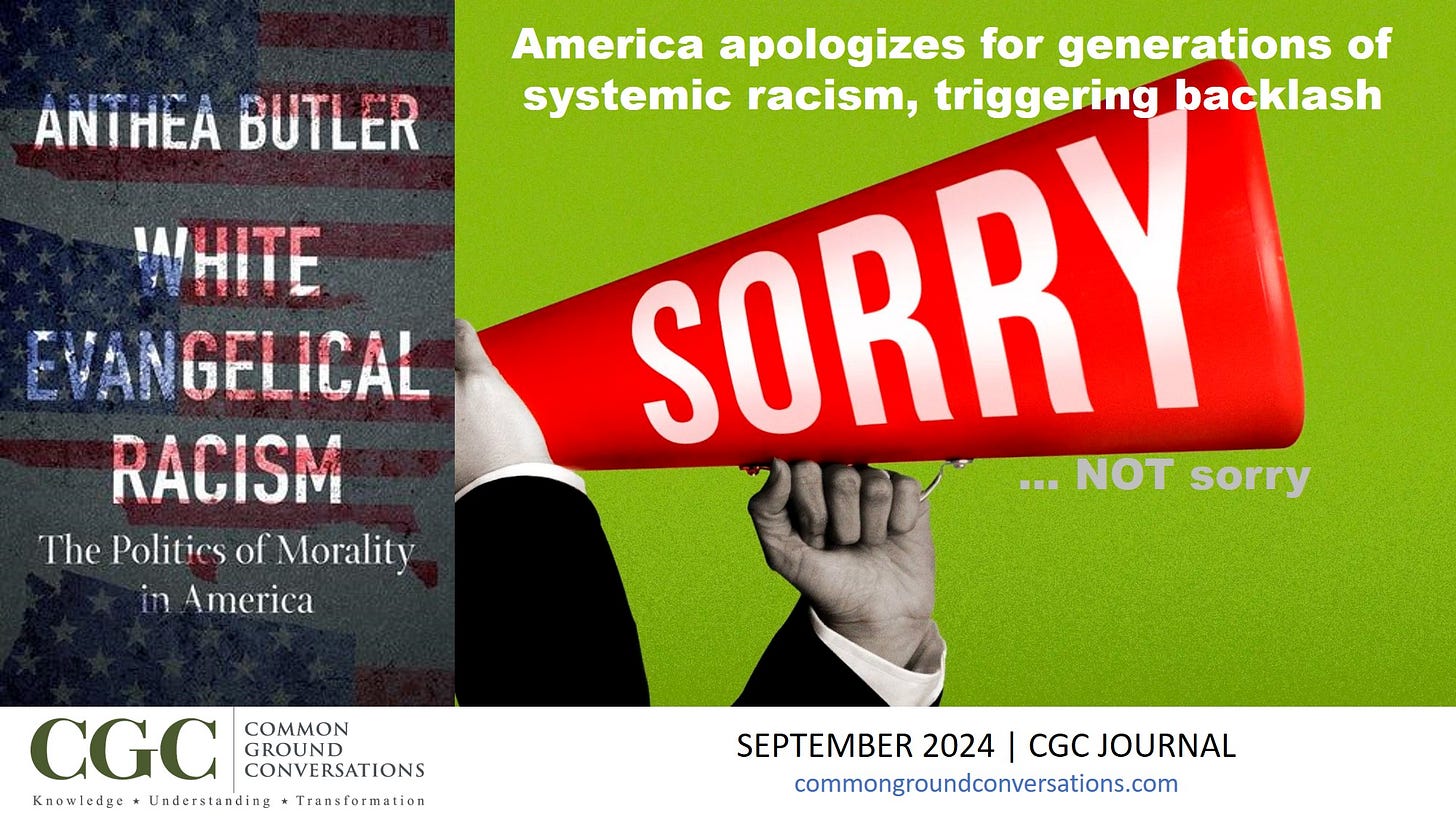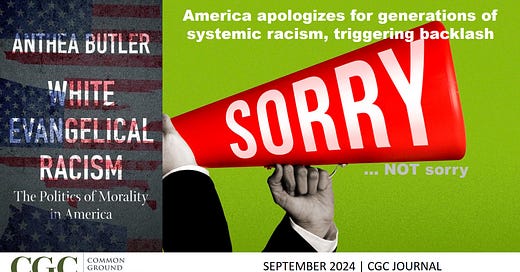CGC Journal - September 2024
We're Building a Co-learning Community of Empathetic Societal Change Agents
SEPTEMBER 2024 | ISSUE 14
SORRY, NOT SORRY
America apologizes for generations of systemic racism, triggering backlash
TABLE OF CONTENTS:
Current Events - Sorry, Not Sorry …
Emily’s Corner - Being seen and heard is transformative and healing
Talking With Kids - Cultivating civic engagement with kids
Barbara’s Perspective - Showing Up is the First Step Toward Unity
African Insights - Obtaining Optimal Health
Recommended Resources - New resources recommended every month
Conversation Starter - Join us for a scheduled one-hour Zoom conversation
THE CGC JOURNAL HAS BEEN PUBLISHING MORE THAN YEAR!
SEE BACK ISSUES TO ADD MORE LINKED RESOURCES TO YOUR LIBRARY.
SORRY, NOT SORRY

Donald J. Trump shocked the nation and the world when he was elected in 2016 as president. That unexpected election result appeared to have accelerated a series of apologies among institutions and municipalities across America and around the world. Institutions of power, wealth, and influence, alongside governments (federal, state, and local) seemed to suddenly increase the previously paltry pace of apologizing for generations of systemic racist laws, systems, public policies, and private sector practices.
These numerous apologies were broad-based and reverberated internationally. Here’s a small sample:
Prior to the acceleration of apologies in America, Europe had established a coalition of 69 European Cities Against Racism
2008-2024: The U.S. Congress started the American apology tour under President Obama. Since then, nine states have formally apologized for generations of racist policies: Alabama, Connecticut, Delaware, Florida, Maryland, New Jersey, North Carolina, and Virginia (Note Virginia … we’ll come back to it).
2017: Cities with racial equity policies – The National League of Cities began keeping a repository of cities with racial equity initiatives.
2020: NAR apologizes for racist policies – The president of the National Association of Realtors® publicly apologized for generations of racist policies and practices in collusion with federal, state and local governments, mortgage and title companies, banks, appraisers and Fannie Mae and Freddie Mac.
2020: Federal Reserve webinar series addresses racism and root causes: The Fed announced an effort to address systemic racism and its root causes. “Our goal is to focus on root causes rather than the symptoms and spark conversations that hopefully spur leaders in the public, private, and nonprofit sectors to take actions to increase racial equity and justice.”
2020: Atlanta Fed warns that racism is a danger to the health of the US economy.
2020: Citibank report – Citibank published a report proclaiming the loss of $16T due to racism in the banking industry over the past 20 years. 2024 UPDATED Citibank report – Continued racism 2020-2024. A new Citibank reports reveals the ongoing impact of systemic racism in banking, which added another loss of $3.9T to GDP since its last report.
2020: Ranked – US cities with highest concentration of racial segregation
2021: US Bank apologizes for racist behavior
2022: Anti-Racist Cities Network – Rio De Janeiro led the development of a network of international cities committed to adopting anti-racist policies and practices.
2022: Fannie Mae addresses systemic inequities – Fannie Mae introduced an equitable housing plan to develop affordable housing and address systemic problems faced by Black homeowners and renters.
2022: Boston apologizes to Black residents – The City of Boston, Massachusetts formally apologized for its integral role in slavery and lasting impact of “systemic racism and white supremacy.” Note: The first constitution on this continent was the 1780 Massachusetts Constitution, written by John Adams, one of America’s founding fathers. The Massachusetts Constitution explicitly called for a state ruled by “Christian” landowners. That document became the template for the U.S. Constitution.
2022: Wales Anti-Racist Action Plan – The nation of Wales produced a historic Anti-Racist Action Plan that it attributed directly to the 2020 murder of George Floyd in the United States, which inspired the nation to do something about its own racist history. The Plan, updated in June 2024, led to the election of the first Black president in the history of Wales and the United Kingdom, Vaughan Gething, in 2024.
2023: City Planning to end racism – UC Davis report: What cities can do to address racism. Hint: It starts with city planning.
2023: Federal Reserve wants to end racial discrimination in banking & Fed creates new rule to combat racial discrimination in bank lending practices
2023: How to build anti-racist cities – The International Observatory on Participatory Democracy and United Cities and Local Governments produced a conference for cities adopting anti-racist policies and practices.
2024: Global Forum to end racism - Barcelona – This year, Barcelona, Spain will host the next Global Forum to End Racism.
2024: San Francisco apologizes to Black residents, becoming just the second large U.S. city to formally apologize for systemic racism. (Boston was first).
2024: State of Black America report produced by the Urban League reveals that the incremental progress made in civil rights and economic justice, since the 1960s, is currently under serious threat.
2024: Remember, the state of Virginia in 2007 issued a formal apology for generations of slavery and systemic racism. It called for reconciliation by all Virginians. This year, the University of Virginia suspended campus tours that “besmirched” the name of Thomas Jefferson (the university’s founder), by mentioning he was a slaveholder.
WHO OPPOSES APOLOGIZING FOR RACIST POLICIES AND PRACTICES?
Who stands in opposition to efforts that acknowledge systemic racism, apologize for it, and start to chart a new corrective course toward reconciliation and repair of generations of harm? The same population that has stood opposed to such efforts in each generation: a majority of White Christian conservative evangelicals.
A solid majority of White Christian conservative evangelicals are not shy about their priorities for America, nor reserved about their willingness to mobilize around political candidates and seek to secure power at all levels of governance while resisting efforts to transform the 20th century racially segregated nation we all inherited into a more equitable Inclusive America.
White Evangelical Racism: The Politics of Morality in America chronicles the historical timeline of White evangelical Christianity in American politics. It is a must-read book by Anthea Butler, a professor at the University of Pennsylvania … published in 2021 by the University of North Carolina Press.
Butler provides a well-researched deep insight into the history of the White evangelical movement and the power it wields in American politics as an obstacle to efforts toward racial equity. This is my recommended resource for this month. See more in the Recommended Resources section of this month’s CGC Journal.
EMILY’S CORNER
Emily Corner is a place of honest sharing; of reflections and insights and experiences that are unfolding in my journey as a co-learner. I would love to hear your thoughts and ideas - feel free to reply to this email. I will read all that you share.
Being Seen and Heard is Transformative and Healing
Can you think of a time when you were in a conversation with someone, and you experienced being really seen and heard?
How did that feel?
I can, and as I recall that experience, I feel myself shift into a place of feeling deeply settled, at ease, and exhaling.
I believe that there is something fundamentally transformative and healing about this - perhaps in ways that our language and science hasn’t quite articulated - our nervous system relaxes, our defenses ease, and our soul opens up.
Our common humanity connects.
I’ve been on the receiving end of conversations in my personal relationships in which I’ve been deeply seen and heard, and lately I’ve been pondering this process as it extends into our learning spaces and places.
Is this a piece of how we create conditions for co-learning to happen more deeply?
Might it begin with first, truly seeing and listening?
How can this look?
How might I purpose to truly see and hear the heart and mind of the person I’m engaged in conversation with?
How could this create conditions that ease defensiveness and tension, and create space for transformation and healing?
*One of the exercises that we do in our CGC Activities Workshop is an Active Listening exercise, and I think that it is one of our most energizing and well-received activities because it creates the space to really see and hear the other person in a conversation.
I’d love to hear from you: have you been a part of a conversation in which you felt truly seen and heard?
How did that feel?
TALKING WITH KIDS
Each month, we share a glimpse into a conversation that happened in our home with our children or with others in our community. During their earlier years, these conversations formed the basis for our workshop: “How to Talk to Kids About Race in America.”
CULTIVATING CIVIC ENGAGEMENT WITH KIDS
What an incredible time to be alive, to be seeing and seizing countless moments to have conversations with our children in real-time, as events unfold.
Examples of 2 opportunities that we embraced in real-time with our children this month to cultivate civic engagement …
CIVIC ENGAGEMENT LESSON 1
Last week, the DNC was being televised, and it was the evening of the roll call … delegates from each state, voicing their support for Kamala Harris as the Democrats’ nominee for president.
As the roll call began, Mike invited the boys in and shared with them that they get to “see the process as it happens, and so you will have understanding and not wonder about how this works.”







